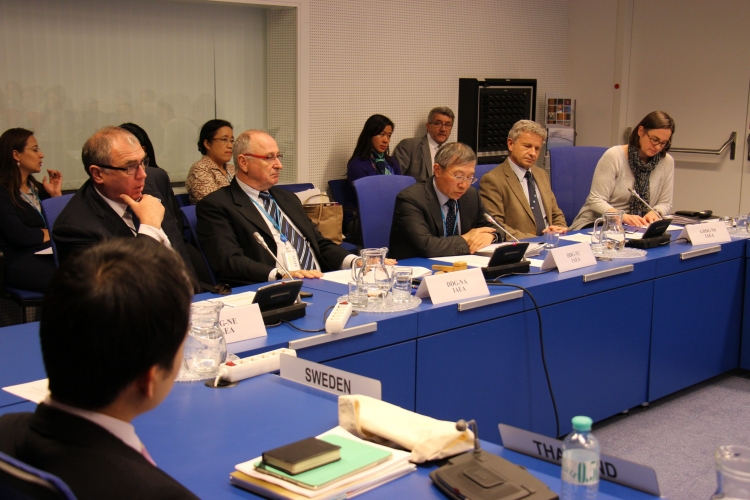On 27 October 2015, the IAEA's Department of Technical Cooperation (TC) held its sixth annual all-day Seminar on Technical Cooperation for Diplomats at the IAEA's headquarters in Vienna. The Seminar, which is organized once a year for delegates who work on IAEA issues, and in particular for new delegates who have recently joined the Permanent Missions, aimed to provide an overview of the TC programme and a platform for questions and answers to facilitate a common understanding of the TC programme and informed discussion and decision-taking.
Some 50 delegates from 38 Permanent Missions in Vienna attended the seminar to deepen their knowledge about the IAEA's TC programme.
The delegates were welcomed by IAEA Deputy Director General (DDG) and Head of the Department of Technical Cooperation Mr Dazhu Yang. Following his opening statement, senior staff from across the IAEA provided presentations on different themes in ten sessions. "To ensure that each Member State benefits to the maximum from the programme, it is important that all stakeholders maintain an open, transparent dialogue with each other. We therefore want to hear from you, and we also want to be sure that you are fully informed on all aspects of the programme, from policy to practice", said DDG Yang in his welcome address. "The vision that guides the technical cooperation activities of the Agency is to forge human and institutional capacity in Member States to safely utilize nuclear technologies to address local needs, global issues and contribute to national development," highlighted Ana Raffo-Caiado, Director of the Division of Programme Support and Coordination in the Department of Technical Cooperation, in her presentation.
The sessions of the morning covered subjects such as the role of the IAEA as an independent international organization within the UN system and its policy framework; the mechanisms of the IAEA to identify and address the priorities and needs of its Member States through the TC programme as well as the TC programme in the international development context, with particular emphasis on the post-2015 agenda and the newly adopted sustainable development goals (SDGs). "The SDGs make explicit mention of science, technology and innovation (STI) as contributors to development and the IAEA can assist Member States in using STI to achieve their national development priorities, thus contributing to reaching their national SDG targets," highlighted Susanne Nebel, Programme Planning Officer, in her presentation on the TC programme in the international development context.
Another subject covered during the morning was the IAEA's contribution to combatting the growing cancer burden, in particular in low and middle income countries, through the Programme of Action for Cancer Therapy (PACT). "PACT was created to bring together international partners to help address the dramatically growing cancer crisis in the developing world. The programme builds on the IAEA's 40 years of experience in supporting countries to expand access to equitable and affordable cancer care for all in need," said Nelly Enwerem-Bromson, Director of the Programme of Action for Cancer Therapy, in her presentation.
The last presentation of the morning provided an overview of the mechanisms the IAEA applies to ensure that support to Member States through the TC programme is characterized by the highest standards of safety and security and how Member States can obtain assistance through the TC programme to develop and implement robust nuclear safety and security infrastructures.
The afternoon sessions focused on subjects such as the TC programme cycle; the roles and responsibilities in the TC programme and the financing of the TC programme.



